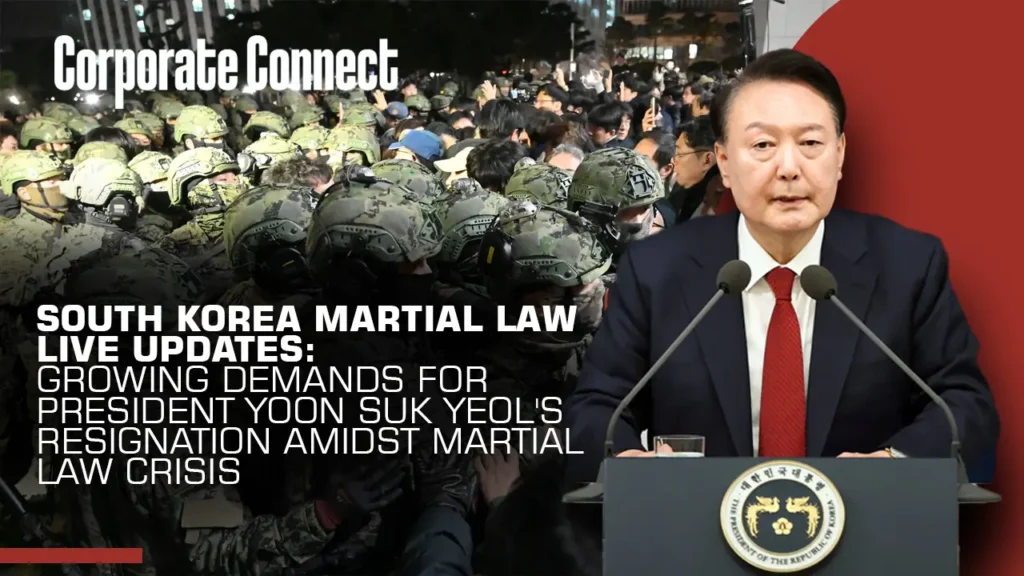Yoon Suk Yeol Declares Martial Law: South Korean Parliament Rejects Move
south korea news Hours after President Yoon Suk Yeol imposed martial law, the South Korean Parliament unexpectedly voted against the decision. Woo Won Shik, the speaker of the National Assembly, further ruled martial law to be unconstitutional, thus escalating the political unrest around the president’s choice. As the nation considers the ramifications of the statement, the action has generated intense discussion and demands for responsibility.

Yoon Suk Yeol Declares Martial Law: South Koreans Demand President’s Resignation Amidst Political Turmoil
Protesters gathered outside South Korea’s National Assembly on Wednesday morning to call for the resignation of President Yoon Suk Yeol, who had declared martial law but later lifted it. Following the president’s abrupt and contentious decision, representatives of opposition parties and trade unions are demanding his resignation.
President Yoon’s unexpected declaration of martial law was quickly lifted as 190 members of parliament voted against it. Two hours after the decree went into effect, legislators assembled at the National Assembly to oppose the president and stop it.

In a broadcast speech on Tuesday, President Yoon declared “emergency martial law,” accusing the opposition of “sympathizing with North Korea” and undermining the government through “anti-state activities.” This exacerbated the situation. Military personnel were apparently sent in to execute the rule and made an effort to enter the National Assembly building, according to Reuters. To stop the soldiers from entering, opposition leaders and parliamentary aides retaliated by using fire extinguishers.
Speaker Woo Won Shik declared martial law to be unconstitutional, and the National Assembly later decided to reject it. Speaker Shik demanded that police and military forces leave the Assembly grounds and underlined that parliamentarians would “protect democracy with the people.” The proclamation of martial law by the president of South Korea is subject to cabinet assessment and National Assembly approval by a majority vote, as stipulated by the country’s constitution. The president must abide by the majority’s request to lift it.
Why President Yoon Imposed Martial Law: As tensions between Yoon’s conservative People Power Party and the opposition Democratic Party grew, martial law—which suspends civilian administration and legal processes in favor of military rule—was proclaimed. Yoon found himself in a stalemate with the opposition over the budget bill for the next year following this year’s National Assembly elections, which witnessed a sizable victory for the opposition. In addition, Yoon’s hasty decision to declare martial law was prompted by the opposition’s efforts to remove three senior prosecutors.

FAQ
- Why did President Yoon Suk Yeol declare martial law?
In response to growing political tensions between the opposition Democratic Party and his conservative People Power Party, President Yoon imposed martial law. Yoon declared martial law to regain authority after the opposition won a sizable majority in the National Assembly elections, the budget for the next year was impassed, and three senior prosecutors were impeached. - What happened after martial law was declared?
According to reports, military personnel were sent in to execute “emergency martial law” following President Yoon’s televised speech, and they made an attempt to enter the National Assembly building. In retaliation, parliamentary assistants and opposition leaders blocked the soldiers’ entry with fire extinguishers. - How did the National Assembly respond to the declaration of martial law?
Within two hours of the martial law announcement, the South Korean National Assembly voted to reject the decree. 190 members voted against it, and Speaker Woo Won Shik declared the martial law invalid. The Speaker also called for the withdrawal of police and military personnel from the Assembly grounds, emphasizing the protection of democracy. - What is the constitutional process for declaring martial law in South Korea?
According to South Korea’s constitution, any martial law declaration must be reviewed by the cabinet and approved by the National Assembly. If the majority of the Assembly members request the lifting of martial law, the president must comply. - What are the implications of martial law in South Korea?
Martial law in South Korea suspends civilian government and legal processes, replacing them with military rule. Civil liberties may be suspended during its enforcement, and military authorities assume control over governance and legal matters. - Why are South Koreans protesting President Yoon’s actions?
Protesters are calling for President Yoon’s resignation due to the sudden and controversial decision to impose martial law. The move was seen by many as an overreach of executive power and an attempt to suppress political opposition. Trade union members and opposition leaders are at the forefront of these demands. - What are the political tensions behind this crisis?
The tensions stem from a significant victory by the opposition Democratic Party in this year’s National Assembly elections. This led to a political impasse with President Yoon’s conservative government, particularly over the budget for the upcoming year. Additionally, the opposition’s push to impeach top prosecutors added to the pressure, culminating in the president’s decision to declare martial law. - How did the international community react to the martial law declaration?
International reactions have been focused on the unexpected and dramatic nature of the move. The deployment of military troops to Parliament and the swift rejection by lawmakers raised concerns about the state of South Korea’s democracy and governance.









